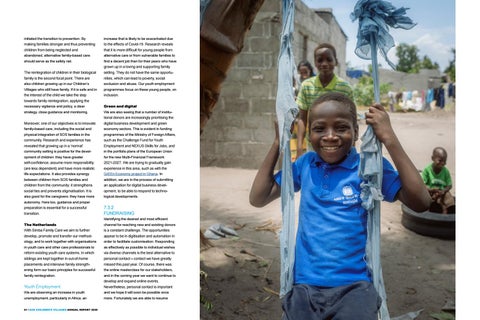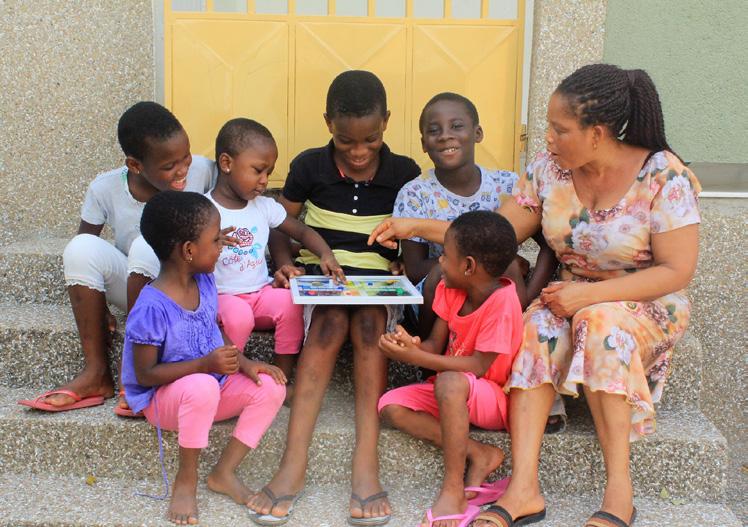initiated the transition to prevention. By
increase that is likely to be exacerbated due
making families stronger and thus preventing
to the effects of Covid-19. Research reveals
children from being neglected and
that it is more difficult for young people from
abandoned, alternative family-based care
alternative care or from vulnerable families to
should serve as the safety net.
find a decent job than for their peers who have grown up in a loving and supporting family
The reintegration of children in their biological
setting. They do not have the same opportu-
family is the second focal point. There are
nities, which can lead to poverty, social
also children growing up in our Children’s
exclusion and abuse. Our youth employment
Villages who still have family. If it is safe and in
programmes focus on these young people, on
the interest of the child we take the step
inclusion.
towards family reintegration, applying the necessary vigilance and policy, a clear
Green and digital
strategy, close guidance and monitoring.
We are also seeing that a number of institutional donors are increasingly prioritising the
Moreover, one of our objectives is to innovate
digital business development and green
family-based care, including the social and
economy sectors. This is evident in funding
physical integration of SOS families in the
programmes of the Ministry of Foreign Affairs,
community. Research and experience has
such as the Challenge Fund for Youth
revealed that growing up in a ‘normal’
Employment and NEXUS Skills for Jobs, and
community setting is positive for the devel-
in the portfolio plans of the European Union
opment of children: they have greater
for the new Multi-Financial Framework
self-confidence, assume more responsibility
2021-2027. We are trying to gradually gain
(are less dependent) and have more realistic
experience in this area, such as with the
life expectations. It also provides synergy
GrEEn Economy project in Ghana. In
between children from SOS families and
addition, we are in the process of submitting
children from the community: it strengthens
an application for digital business devel-
social ties and prevents stigmatisation. It is
opment, to be able to respond to techno-
also good for the caregivers: they have more
logical developments.
autonomy. Here too, guidance and proper preparation is essential for a successful transition.
7.3.2 FUNDRAISING Identifying the desired and most efficient
The Netherlands
channel for reaching new and existing donors
With Simba Family Care we aim to further
is a constant challenge. The opportunities
develop, promote and transfer our method-
appear to be in digitisation and automation in
ology, and to work together with organisations
order to facilitate customisation. Responding
in youth care and other care professionals to
as effectively as possible to individual wishes
reform existing youth care systems. In which
via diverse channels is the best alternative to
siblings are kept together in out-of-home
personal contact – contact we have greatly
placements and intensive family strength-
missed this past year. Of course, there was
ening form our basic principles for successful
the online masterclass for our stakeholders,
family reintegration.
and in the coming year we want to continue to develop and expand online events.
Youth Employment
Nevertheless, personal contact is important
We are observing an increase in youth
and we hope it will soon be possible once
unemployment, particularly in Africa, an
more. Fortunately we are able to resume
61 | SOS CHILDREN’S VILLAGES ANNUAL REPORT 2020






















